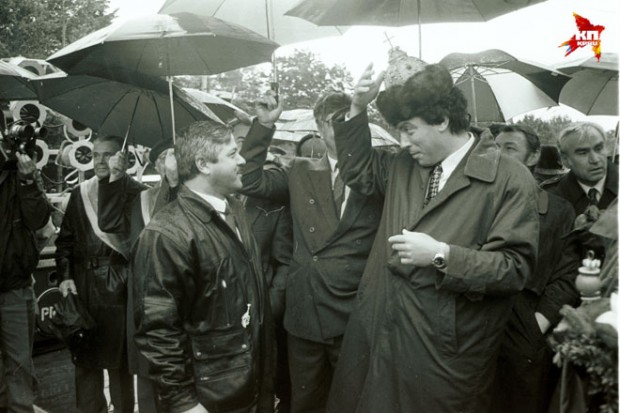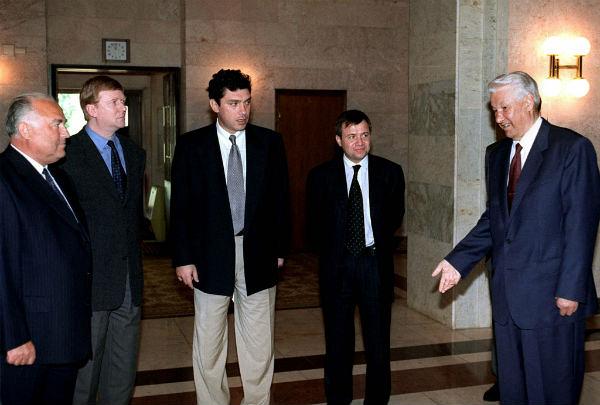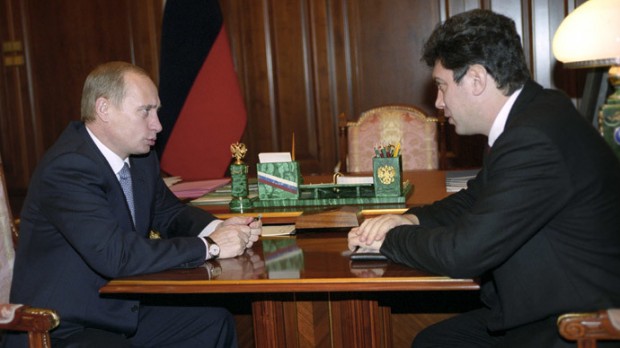In Russia This Week, you will find links to the stories of Russia Update in the last week and to special features, plus an article following up on the news and trending topics below.
Last issue: Ultranationalists Angry over ‘Capitulation’ of Minsk Agreement
This Week’s Top Stories:
–Are Sanctions Against Russia Working to Stop the War in Ukraine?
–Ekho Moskvy Editor Venediktov Questioned by Police About Threat to Journalist Sobchak
–Further Testimony and Videos on Nemtsov’s Murder
–Funeral Line for Slain Opposition Leader Boris Nemtsov Stretches a Kilometer
–Russian Security Refusing to Allow Nemtsov’s Companion Duritskaya To Leave Russia
–Opposition Mourns Leader Boris Nemtsov, Assassinated Near Kremlin
–Opposition Leader Nemtsov Shot Dead, 2 Days Before Leading Protest March
Please help The Interpreter to continue providing this valuable information service by making a donation towards our costs.
I first met Boris Nemtsov in 1991, in Moscow then in Nizhny Novgorod (formerly called Gorky), when he was governor of Nizhegorodskaya Region. Nemtsov, a physicist and mathematician who defended his dissertation at the age of 25, had come to prominence in Nizhny Novgorod for campaigning against the construction of a nuclear power plant in 1986, after the Chernobyl disaster. He was among the perestroika-era reformers and the only non-communist from his region elected to Russia’s first democratic parliament, the Congress of People’s Deputies of the RSFSR. After the defeat of the August coup in 1991, President Boris Yeltsin appointed Nemtsov as one of his reformist governors, an office to which he was later democratically elected in 1995.
I worked for the CBC in Moscow in those years and we decided to follow back to their home provinces some of the young reformists we saw in the Russian parliament. Nizhny Novgorod is about 420 kilometers from Moscow, at that time a very long day’s drive with no facilities along the way. We were startled by the starkness of this provincial city, closed to foreigners until only recently, as it was a key city in the Soviet military-industrial complex. It seemed like “the land that glasnost forgot” with the large portraits of Lenin, Marx and Engels and red Communist banners with slogans everywhere as the only bright spot on a drab landscape, where large thermal pipes stretched across the snowy hills.
Nemtsov, then 32, was among the youngest governors in history, and had energetically tackled the immense task of trying to convert the communist system into something resembling a modern free-market economy. We immediately dubbed him “the Little Prince” – not because he was little, as he was a tall, husky figure, but because it seemed as if he was very young and all alone in charge of a remote planet.
Boris Yefimovich, as everyone called him using his patronymic, had the support of the stolid old “red directors” or communist plant managers and even the KGB. A KGB man whom he inherited as the previous governor’s staff privately explained to me how hard it was to change Russia – everyone was afraid and no one wanted to take initiative, and sometimes, the KGB had to create organizations themselves to get things started or back their own candidates. They backed Nemtsov because they thought reform was unavoidable and no longer trusted the Party.
Boris was very much his own man, free of any past of compromise or corruption. He had made an early alliance with Dr. Andrei Sakharov, who was exiled in the city of Gorky from 1980-1986.
Nemtsov ensured that the apartment where Sakharov lived with his wife Elena Bonner was maintained as a “house-museum” in the Russian style, with his tea mug and desk just as he had left it. He interviewed Sakharov for a local newspapers in 1988, getting his support for the proposal not to build above-ground nuclear power stations.
We spent a week following Boris as he made the rounds as governor, first meeting in his office in the Soviet style with red runners on long tables and bottles of mineral water, then going out to a new fast-food restaurant which was a total marvel for the Soviet people at that time. The owner explained that his greatest difficulty was trying to get chickens for his meals – while he was willing to pay more for them, if they were removed from the existing Soviet distribution system to go to his restaurant, then they were not available to go to schools, offices, hospitals and homes for the aged.
Naturally the solution would be to grow more chickens. But for that the restaurant owner needed land, and fertilizer, and equipment. How could he get a loan for these things, and who would give him the land? Leasing land was a very new experiment then and very much resisted by Russian culture. Each week, the budding entrepreneur faced seemingly overwhelming problems of finding supplies and staff – and facing the hatred of townspeople who felt he was ripping them off by charging a little more and depleting the equal-distribution system.
Boris then showed us a factory that was supposed to be converted from making missiles, which were supposed to be in less demand now that the Soviet Union had collapsed and Russia was going to grow more peaceful, to making tea-pots and commercial ovens for prospective independent bread stores – another entrepreneurial venture.
But there were problems with this idea, as well, as it depended on changing the state purchase-order system, finding new customers, finding parts that weren’t available – it seemed everywhere you turned, there was some problem connected to some other problem that couldn’t be changed, not just due to inertia, but as a result of various personal fiefdoms and sometimes simply lack of knowledge and skill.
We made a visit to one factory and realized another challenge for the would-be bakeries: all the workers were being handed out loaves of bread to take home with them at night. The factory was a “factory town” that provided food, health care, day care, and training all in one place. With potential customers getting free or very low-cost bread, it would be hard to compete.
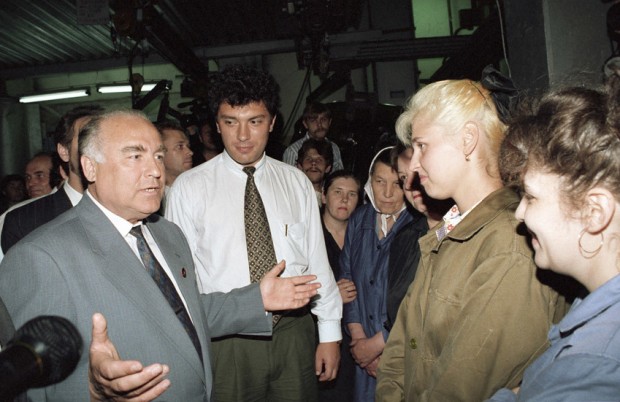
Boris Nemtsov (center) with Prime Minister Viktor Chernomyrdin (L) at the Gorky Automobile Works in 1994. Photo via RT.com
Then there was the arms industry that couldn’t be dismantled overnight, but Nemtsov tackled this squarely, openly organizing an armaments expo and inviting foreigners. Pragmatically, he reasoned that Russia would go on selling armaments to its allies regardless of the collapse of the USSR; he was keen to save jobs and bring business to his province.
Many Westerners looking at the years of social change after the fall of the Soviet Union image it as “Wild East” capitalism run wild, and the problems faced as ones inherent to capitalism.
But the reality for the Soviet Union was that free-market reforms were very hard – nearly impossible in some places – to install. Not only was there a lot of public resistance, there were very real forces constantly blocking them. And people themselves couldn’t change over night. Boris listed for us all the groups of people who would have to be kept on state subsidies – lists longer than most countries not only because of a history of communism but because the Russian people had taken a beating from their own history. There were the World War II veterans, the survivors of the GULAG, and the disabled from Russia’s very high percentage of industrial and home accidents as well as traffic accidents.
We followed Boris one day as he handed out bags of candy to children in an orphanage – he was a born politician, very charismatic, and very mercurial, a quick study of complicated issues and a doer.
A campaign video made for him in those years titled “Governor” captures the feeling of that era and contains a testimonial from a crucial figure – Arkady Volsky, the powerful head of the Union of Industrialists and Entrepreneurs and senior aide to three presidents.
Nemtsov really loved running Nizhny – it was a huge challenge and he was good at it and sometimes small efforts yielded results. Against the odds, he was able to attract foreign investment to the region, and also find business opportunities abroad for some of the city’s businessmen who still remember him today. In fact, Yeltsin had to persuade Nemtsov to come to Moscow to join the government; he even sent his own daughter, Tatyana, to make the arduous trip to Nizhny and convince him in person. Nemtsov, a great supporter of Yeltsin, wasn’t uncritical of him; in 1996, he presented him with a petition signed by a million people to stop the war in Chechnya; the treaty of Khasav-Yurt was concluded in August 1996 that led to the end of the first war.
Appointed first deputy prime minister in 1997, he worked on the same energy issues he was familiar with from his region, but was eventually removed from office in 1998 after the crash of the ruble and the stock market. This hardly fazed him and led to many more energetic attempts on his part to try reform other ways, including winning elections in Sochi and Yaroslavl to work in local legislatures and combat the corruption and inertia endemic to the provinces which he knew first-hand.
This leads some commentators today to describe him as “failed” and “a has-been” although the larger debate to have is whether the failures of the 1990s are about the insurmountable obstacles of the Soviet legacy rather than the attempts at free-market reforms.
There is also some curious wrenching of history regarding Yeltsin’s contemplation of Nemtsov’s candidacy as a possible successor of himself as president – because he thought about this out loud, some people think this was an actual option. But in a famous interview in the tabloid news.ru, in fact Yeltsin refers to Nemtsov as a “partisan” (i.e. as a guerrilla fighter) and concludes he was too radical for the job—he ended up choosing Vladimir Putin. For Yeltsin, even Nemtsov’s trademark white khaki pants were too radical — he was shocked when Boris wore them to meet Azerbaijani President Heidar Aliyev. Yeltsin might also have added a crucial factor for Russian politics: Boris had a Jewish heritage, although he had been baptized into the Russian Orthodox Church. In anti-Semitic Russia, it would be impossible to become president – and still is – with such a family tree.
A famous story about Nemtsov recalled after his assassination and retold by Leonid Bershidsky at Bloomberg based on the news.ru account, claims the Yeltsin was “annoyed” at Nemtsov for proposing a bold plan to have all the government officials stop riding around in foreign-model cars and move to domestic models. As can be seen from his own memoir, however, Yeltsin wasn’t irritated but thought this idea was curious and impractical. Even so, he let Boris go ahead with the plan because he saw that it would be a symbolic change much needed for the public to shed the negative image of those in power.
This simple “buy Russian” plan was no different than a “buy American” plan or mandates like the State Department requirement that officials must use US airlines to travel — yet became something suspect if Nemtsov proposed it. Back in 2000, Stephen Kotkin accused Nemtsov of wanting to pump up business for the Gorky Automobile Plant, the largest in Russia, with this plan (his article of that year also makes out Nemtsov and other reformers in the “Union of Right Forces” like Sergei Kiriyenko to be lightweights who had no experience or government connections, ridiculed by their subordinates, thereby justifying the selection of Putin. As if connections in the old Soviet apparat was a plus.)
The actual business for his region’s plant from a few dozen top officials changing to domestic makes wouldn’t have been significant; Nemtsov said it would be good for Russia as a whole and urged the plan for its symbolic value. And indeed, what’s wrong with improving business for Russia’s largest car plant, or the nation’s automotive industry? This story is emblematic of the spleen with which people react to reformers not only in Russia but abroad. In the end, Boris’ experiment failed when his own Volga overheated and broke down in the center of Moscow – a very publicized breakdown that was emblematic of the 1990s reforms for many. Indeed, the failure of communism’s centralized planning and non-competitive manufacturing were the causes, yet even now Nemtsov, who had been gone from Nizhny Novgorod for two decades at his death, is blamed for the grimness of “Russia’s Detroit” today , as if it were the result of “neo-liberal policies.”
Boris used to tell a funny story about a meeting with Putin – he did have such meetings and was not merely formally shaking his hand as some have said. Boris complained about the fact that Putin had kept the same melody of the Soviet national anthem for Russia’s new national anthem, only changing the words. “Why are you keeping an anthem associated with the terrible Soviet past?” asked Nemtsov.
“Such a song, for such a people,” Putin deadpanned. In other words, the Russian people were still wedded to the tune, wouldn’t change, and needed to be coddled with what was familiar to them.
Some accounts of Nemtsov describe him as a “bon vivant” or “bon viveur” as if all he did was sit in the cafes and drink cognac, remembering his past glories. This is completely inaccurate, because while Nemtsov enjoyed going to a good restaurant just like any Western journalist would – it’s normal in normal countries – he worked hard and accomplished some impressive things in very difficult conditions.
Boris was at every major opposition rally in the last decade, often on the speaker’s platform or ending the event led away by police.
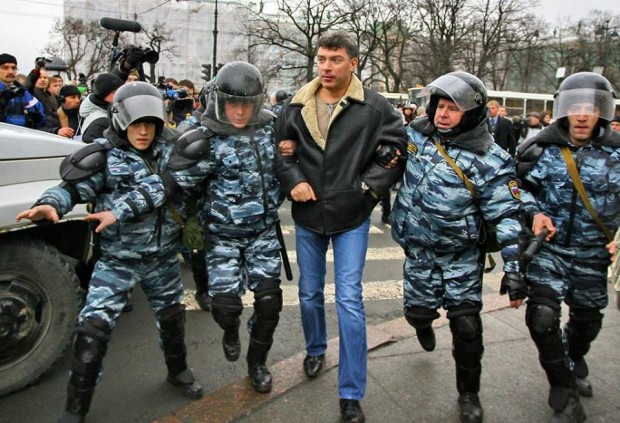
Boris Nemtsov, arrested by OMON riot police in St. Petersburg in 2007. Photo by Andrey Sidorov / Interpress / PhotoXPress
Starting in 2009, Nemtsov planned and attended the Strategy 31 meetings and pickets trying to force the government to concede that public gatherings and demonstrations must be allowed under the Russian constitution as a default, rather than making individuals endlessly queue up to various bureaucratic offices to get permits even for small pickets. He was also active in the demonstrations against the highway in Khimki that was going to destroy a forest. This paved the way for the beginning of the anti-Putin marches of December 2011.
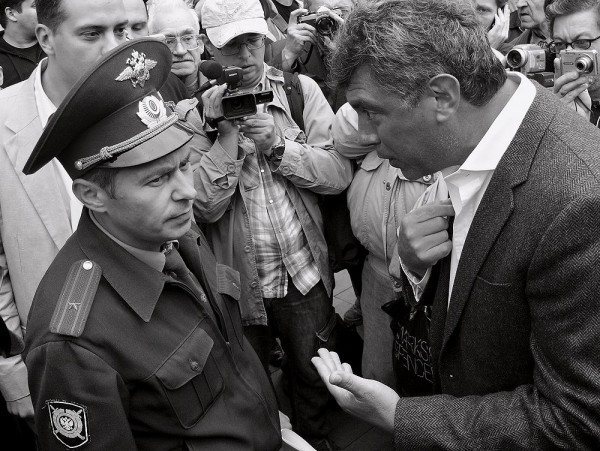
Boris Nemtsov trying to reason with a policeman stopping a demonstration regarding destruction of the forest in Khimki. Photo by Evgeny Chesnokov
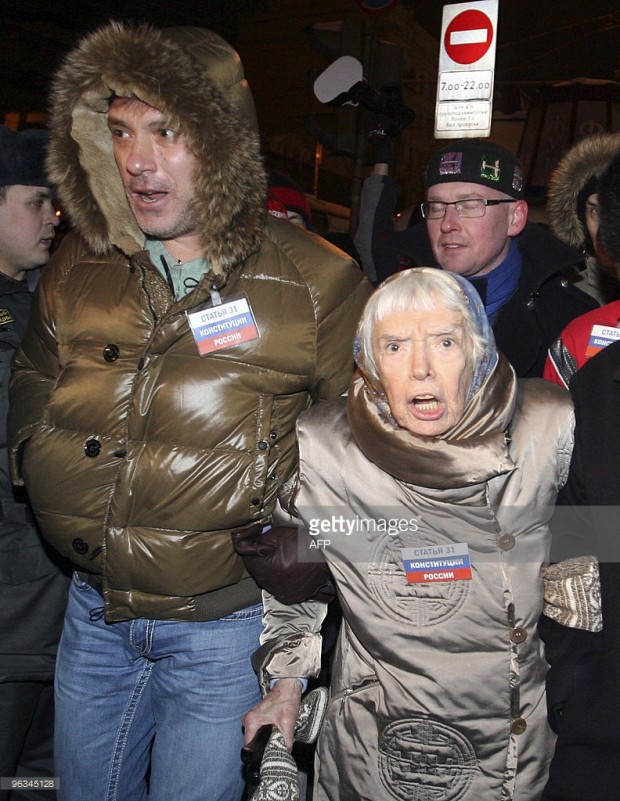
Boris Nemtsov and Ludmila Alexeyeva, veteran human rights leader and chair of Moscow Helsinki Group in 2010 at Strategy 31 demonstration.
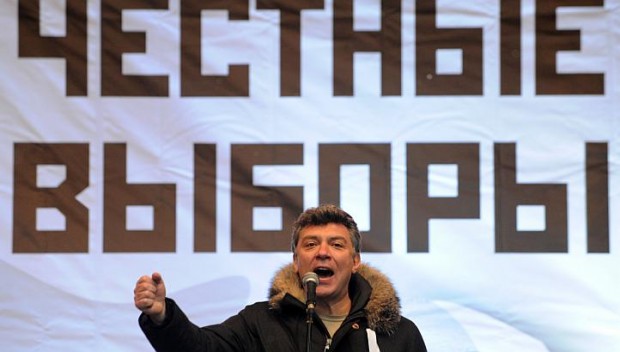
Boris Nemtsov speaking at the Bolotnaya Square rally against Putin’s fraudulent election, December 20, 2011. Photo by AFP
In recent years, every morning, Nemtsov got up, scanned all the news, and wrote a short, pithy, pitch-perfect piece on his Facebook page. He was banished as a regular blogger from Ekho Moskvy more than a year ago when Ekho was accused of “extremism” by the state censor and the editor had to sacrifice the more radical blogs, although occasionally he was brought back – as indeed he was just hours before his death – to the radio. He seemed to find Facebook more amenable to other sites that could suffer outages and blockages and he had a large following there. He would often deliver multiple posts a day, and in one paragraph or with one photo, explain in a nutshell what terrible thing the Putin government was doing that day.
Boris was the driving force behind a major expose of the Sochi Olympics, Winter Olympics in the Sub-Tropics which he calculated cost three times more than any other Olympic Games in history — $51 billion. He perused official budgets, corporate financial reports, and news accounts to put together a devastating portrait of how Putin and his cronies were exploiting the contracts and loans for the Games for their own benefit.
He had also been a major supporter inside Russia of the Magnitsky Act to sanction those directly involved with the killing of lawyer Sergei Magnitsky and other massive violators of human rights. When then-US ambassador Michael McFaul tried to portray the Russian opposition as opposed to such sanctions, citing some of Nemtsov’s colleagues, he responded by rallying and unifying key opposition leaders around an op-ed for the Wall Street Journal.
Nemtsov was most certainly under frequent if not regular surveillance by the Russian intelligence as his cell phone conversations were recorded and leaked to the state media in an effort to discredit him and split the opposition, some of whose members came in for a scathing characterization by Boris. He was made the protagonist of various state campaigns against the “fifth column” on billboards and banners – one of them shows him in the center:
A planned broadcast in NTV’s scurrilous series “Anatomy of Protest” vilifying the opposition was to have aired March 1 with Nemtsov in a starring role; only his assassination stopped it.
A video uploaded to YouTube on February 16, two weeks before his murder, shows how charismatic he was and how people’s faces lit up as he personally handed out leaflets for the opposition’s “Spring” march. This is what the authorities feared.
All of us who have known Nemtsov and his colleagues for many years and have watched the climate deteriorate under Putin find that his murder is a turning point. I personally have translated for six public figures in Russia and Belarus who were killed by assassins for political reasons, including Boris.
What makes Nemtsov’s murder different? At the time of his death, he was a deputy in a local legislature of Yaroslavl Region, a leader in the Republican Party of Russia-PARNAS and the opposition’s coordinating council, and had been out of government since 1998 when he was forced to leave office after the crash of the ruble.
So he was a former top Kremlin official — but in the list of all those killed in the last 20 years, he was one of the few former officials to have been assassinated and the only one in Moscow; the other three were in Dagestan (ministers Magomedsalikh Gusayev in 2003 and Zagir Arukhov in 2005) and Chechnya (Akhmad Kadyrov, father of Ramzan Kadyrov in 1994). Indeed, he may be the first such former Kremlin official to be killed in Moscow since the Stalin era, when such executions were common. The list of those killed in recent decades has journalists, lawyers, priests and parliamentarians, but it contains very few current or former government officials.
That’s because there has been an unwritten understanding since the Stalin terror that when governments change, the former officials in power will not be punished, and that even those who fall out of favor will suffer jail rather than death as their punishment. Now, that line has been crossed.
